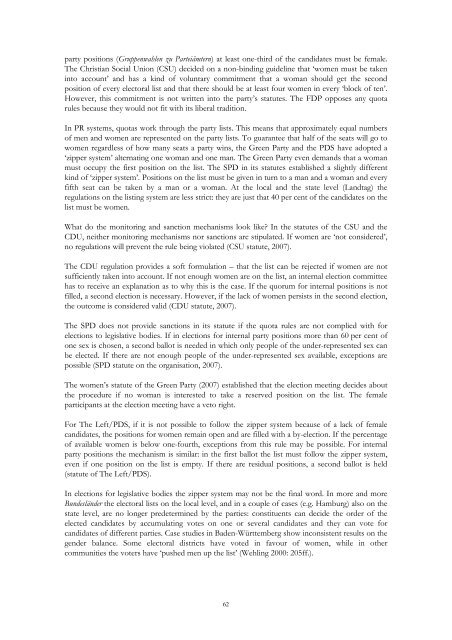party positions (Gruppenwahlen zu Parteiämtern) at least one-third of the c<strong>and</strong>idates must be female.The Christian Social Union (CSU) decided on a non-b<strong>in</strong>d<strong>in</strong>g guidel<strong>in</strong>e that ‘women must be taken<strong>in</strong>to account’ <strong>and</strong> has a k<strong>in</strong>d of voluntary commitment that a woman should get the secondposition of every electoral list <strong>and</strong> that there should be at least four women <strong>in</strong> every ‘block of ten’.However, this commitment is not written <strong>in</strong>to the party’s statutes. The FDP opposes any quotarules because they would not fit with its liberal tradition.In PR <strong>systems</strong>, <strong>quotas</strong> work through the party lists. This means that approximately equal numbersof men <strong>and</strong> women are represented on the party lists. To guarantee that half of the seats will go towomen regardless of how many seats a party w<strong>in</strong>s, the Green Party <strong>and</strong> the PDS have adopted a‘zipper system’ alternat<strong>in</strong>g one woman <strong>and</strong> one man. The Green Party even dem<strong>and</strong>s that a womanmust occupy the first position on the list. The SPD <strong>in</strong> its statutes established a slightly differentk<strong>in</strong>d of ‘zipper system’. Positions on the list must be given <strong>in</strong> turn to a man <strong>and</strong> a woman <strong>and</strong> everyfifth seat can be taken by a man or a woman. At the local <strong>and</strong> the state level (L<strong>and</strong>tag) theregulations on the list<strong>in</strong>g system are less strict: they are just that 40 per cent of the c<strong>and</strong>idates on thelist must be women.What do the monitor<strong>in</strong>g <strong>and</strong> sanction mechanisms look like? In the statutes of the CSU <strong>and</strong> theCDU, neither monitor<strong>in</strong>g mechanisms nor sanctions are stipulated. If women are ‘not considered’,no regulations will prevent the rule be<strong>in</strong>g violated (CSU statute, 2007).The CDU regulation provides a soft formulation – that the list can be rejected if women are notsufficiently taken <strong>in</strong>to account. If not enough women are on the list, an <strong>in</strong>ternal election committeehas to receive an explanation as to why this is the case. If the quorum for <strong>in</strong>ternal positions is notfilled, a second election is necessary. However, if the lack of women persists <strong>in</strong> the second election,the outcome is considered valid (CDU statute, 2007).The SPD does not provide sanctions <strong>in</strong> its statute if the quota rules are not complied with forelections to legislative bodies. If <strong>in</strong> elections for <strong>in</strong>ternal party positions more than 60 per cent ofone sex is chosen, a second ballot is needed <strong>in</strong> which only people of the under-represented sex canbe elected. If there are not enough people of the under-represented sex available, exceptions arepossible (SPD statute on the organisation, 2007).The women’s statute of the Green Party (2007) established that the election meet<strong>in</strong>g decides aboutthe procedure if no woman is <strong>in</strong>terested to take a reserved position on the list. The femaleparticipants at the election meet<strong>in</strong>g have a veto right.For The Left/PDS, if it is not possible to follow the zipper system because of a lack of femalec<strong>and</strong>idates, the positions for women rema<strong>in</strong> open <strong>and</strong> are filled with a by-election. If the percentageof available women is below one-fourth, exceptions from this rule may be possible. For <strong>in</strong>ternalparty positions the mechanism is similar: <strong>in</strong> the first ballot the list must follow the zipper system,even if one position on the list is empty. If there are residual positions, a second ballot is held(statute of The Left/PDS).In elections for legislative bodies the zipper system may not be the f<strong>in</strong>al word. In more <strong>and</strong> moreBundesländer the electoral lists on the local level, <strong>and</strong> <strong>in</strong> a couple of cases (e.g. Hamburg) also on thestate level, are no longer predeterm<strong>in</strong>ed by the parties: constituents can decide the order of theelected c<strong>and</strong>idates by accumulat<strong>in</strong>g votes on one or several c<strong>and</strong>idates <strong>and</strong> they can vote forc<strong>and</strong>idates of different parties. Case studies <strong>in</strong> Baden-Württemberg show <strong>in</strong>consistent results on the<strong>gender</strong> balance. Some electoral districts have voted <strong>in</strong> favour of women, while <strong>in</strong> othercommunities the voters have ‘pushed men up the list’ (Wehl<strong>in</strong>g 2000: 205ff.).62
It may be worth mention<strong>in</strong>g that most parties had established several <strong>in</strong>formal quota rules for years– <strong>in</strong> the context of regional background, position <strong>in</strong> the work force, membership <strong>in</strong> differentpolitical w<strong>in</strong>gs <strong>and</strong> so on. These rules are not written, but <strong>in</strong> the process of selection <strong>and</strong>nom<strong>in</strong>ation most parties try to balance more conservative versus progressive c<strong>and</strong>idates, c<strong>and</strong>idatesfrom trade unions versus employers, c<strong>and</strong>idates from the north of the country <strong>and</strong> the south, tomention just a few of the hidden quota rules.4. ImplementationThis section evaluates the effectiveness of the quota system <strong>in</strong> Germany. It does so <strong>in</strong> three ways.First, the c<strong>and</strong>idate selection <strong>and</strong> the nom<strong>in</strong>ation process are described briefly. Second, it exam<strong>in</strong>eswhether the parties that have quota rules comply on the electoral lists with <strong>their</strong> zipper <strong>systems</strong>.Third, the numerical outcomes <strong>in</strong> nation-state, state <strong>and</strong> local parliaments <strong>and</strong> <strong>in</strong> the <strong>Europe</strong>anParliament, as well as <strong>in</strong>ternal party positions, are analysed.4.1. C<strong>and</strong>idate selection <strong>and</strong> nom<strong>in</strong>ation process: quota regulations <strong>in</strong>crease the recruitment ofwomenInterviews with female German politicians demonstrate that the c<strong>and</strong>idate selection <strong>and</strong>nom<strong>in</strong>ation processes are strongly <strong>in</strong>fluenced by quota rules (Geissel 1999; Geissel <strong>and</strong> Hust 2005).Because of the quota rules, parties were look<strong>in</strong>g for women. In parties with quota rules, femaleparty members often received encouragement to start a political career. Women seem to developpolitical aspirations more often <strong>in</strong> these parties than <strong>in</strong> non-quota parties. The f<strong>in</strong>d<strong>in</strong>gs ofqualitative studies lead to the hypothesis that quota rules lead not only to the mobilisation ofwomen generally but also to the mobilisation of women who do not have a strong political or socialelite background.In contrast, recruitment of women <strong>in</strong> parties that do not have quota rules is often restricted towomen who come from politically <strong>in</strong>volved families <strong>and</strong> a social elite background. These womenhave often aspired to political careers from the beg<strong>in</strong>n<strong>in</strong>g of <strong>their</strong> party membership, supportedstrongly by <strong>their</strong> families (Geissel <strong>and</strong> Hust 2005; Geissel 1999; Schwart<strong>in</strong>g 1995: 41ff; Meyer1994). However, quantitative studies are necessary to substantiate this hypothesis.4.2. Positions of women on electoral lists: quota rules mostly fulfilledAt elections on the nation-state <strong>and</strong> state level, parties that have quota rules do mostly abide bythem – for example, <strong>in</strong> Hesse (2008), Mecklenburg-Western Pomerania (2006), Hamburg (2004),Br<strong>and</strong>enburg (2004), Lower Saxony (2008) or Rh<strong>in</strong>el<strong>and</strong>-Palat<strong>in</strong>ate (2006), with m<strong>in</strong>or exceptionsthe SPD follows its zipper system with every fifth position open to each sex (mostly taken by aman). Only <strong>in</strong> a few cases (e.g. Saxony 2004) did the SPD not fully satisfy its own requirements.The Green Party’s lists generally start with a woman <strong>and</strong> a woman occupies every position with anodd number. The electoral lists of The Left/PDS, where they put up a list, also stick to <strong>their</strong> zippersystem. Exceptions are few <strong>and</strong> m<strong>in</strong>or. All three parties that have zipper <strong>systems</strong> show a tendencyto get less serious at the end of the lists, where men outweigh women: for example, the SPD list forNorth Rh<strong>in</strong>e-Westphalia ab<strong>and</strong>ons the zipper system at position 90, with the last 30 positions be<strong>in</strong>galmost ‘men only’. However, these positions on the list seldom have a chance of be<strong>in</strong>g electedanyway. Generally, all parties with quota rules make sure that women are well represented on thelists for the L<strong>and</strong>tage.The follow<strong>in</strong>g f<strong>in</strong>d<strong>in</strong>gs on the electoral lists at the local level are based on over 50 r<strong>and</strong>omlyselected case studies (for details see the list of ‘other sources’). In big cities, compliance is relativelyhigh. For example, <strong>in</strong> Berl<strong>in</strong>-Mitte (2006) or Frankfurt/Ma<strong>in</strong> (2006) the SPD, The Left/PDS <strong>and</strong>the Green Party did abide by <strong>their</strong> respective zipper <strong>systems</strong>. However, especially <strong>in</strong> small or rural63
- Page 3 and 4:
Directorate-General Internal Polici
- Page 5 and 6:
Electoral Gender Quota Systems andT
- Page 8 and 9:
AppendicesThe methodology of the qu
- Page 10 and 11:
Table 41. Women’s representation
- Page 12 and 13:
1. Mapping of electoral gender quot
- Page 14 and 15:
Committee of Ministers’ Recommend
- Page 16 and 17: have occurred after election day -
- Page 18 and 19: parties and take the form of intern
- Page 20 and 21: Knowledge of different electoral qu
- Page 22 and 23: support for female candidates has s
- Page 24 and 25: of more women in politics. Many opp
- Page 26 and 27: Figure 3. The incremental track mod
- Page 28 and 29: is probably that gender quotas rema
- Page 30 and 31: to gender quotas. Likewise, the dat
- Page 32 and 33: ‘Special organisation for women w
- Page 34 and 35: individual parties that adopt them,
- Page 36 and 37: political party in the Swedish Parl
- Page 38 and 39: then the requirement of 50 per cent
- Page 40 and 41: proportion of women elected in the
- Page 42 and 43: and organisation of women are cruci
- Page 44 and 45: Matland, Richard E., ‘Enhancing W
- Page 46 and 47: Case studyBelgium: a best practice
- Page 48 and 49: While the 1994 act applied to all e
- Page 50 and 51: need to include at least one woman,
- Page 52 and 53: introduced, individual parties adop
- Page 54 and 55: Marissal, Claudie and Hansen, Ingri
- Page 56 and 57: In order to correct the discriminat
- Page 58 and 59: The legal vacuum pertaining to the
- Page 60 and 61: y women in terms of number of seats
- Page 62 and 63: 5. ‘Virtuous dynamic’: the symb
- Page 64 and 65: Case studyGermany: successful quota
- Page 68 and 69: districts, quota rules are often no
- Page 70 and 71: Table 14. Success rates of female a
- Page 72 and 73: Figure 5. Development of the percen
- Page 74 and 75: so far no formal rules have been ad
- Page 76 and 77: Case studyPoland: one step forward,
- Page 78 and 79: 16 in Poland)Rady powiatów(second
- Page 80 and 81: 3. Evaluation3.1. Candidate lists i
- Page 82 and 83: List, in Ozorków Women of Tomorrow
- Page 84 and 85: 3.4. Representation of women in oth
- Page 86 and 87: Case studySlovenia: from voluntary
- Page 88 and 89: council. The positions of candidate
- Page 90 and 91: 3.2.2. The introduction of legislat
- Page 92 and 93: Table 25 shows that only one of the
- Page 94 and 95: Source: Author’s own calculation
- Page 96 and 97: Zakon o volitvah v Evropski parlame
- Page 98 and 99: Advocates for quotas for women lobb
- Page 100 and 101: Table 31. The percentage and number
- Page 102 and 103: Table 33. Municipality elections in
- Page 104 and 105: Case studySweden: small steps, big
- Page 106 and 107: 40 per cent of either sex on the pa
- Page 108 and 109: voluntary party quotas than in part
- Page 110 and 111: The zipper system (50 per cent) int
- Page 112 and 113: While quotas for minority groups ha
- Page 114 and 115: Case studyThe United Kingdom: polit
- Page 116 and 117:
In contrast to Labour, the Scottish
- Page 118 and 119:
The twinning and zipping policies a
- Page 120 and 121:
differences across the political pa
- Page 122 and 123:
Appendix IThe methodology of the qu
- Page 124 and 125:
Brigitte Geissel is a political sci
- Page 126:
ZLSDZZPUnited List of Social Democr






